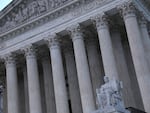
A view of the U.S. Supreme Court in Washington, D.C., on June 5.
Alex Wong / Getty Images
The U.S. Supreme Court found that Harvard and the University of North Carolina’s admissions policy violated the equal protection clause of the 14th Amendment.
The decision reverses decades of precedent upheld over the years by narrow court majorities that included Republican-appointed justices. It could end the ability of colleges and universities — public and private — to do what most say they still need to do: consider race as one of many factors in deciding which of the qualified applicants is to be admitted.
At issue were affirmative action programs at the University of North Carolina, which until the 1950s did not admit Black students, and Harvard University, which was the model for the Supreme Court's 1978 decision declaring that colleges and universities may consider race as one of many factors, from the applicant's geographical and family background, to their special talents in science, math, athletics, and even whether the applicant is the child of the school's alumni.
The two cases overlap. Because UNC is a state school, the question is whether its affirmative action program violates the 14th Amendment's guarantee to equal protection of the law. And even though Harvard is a private institution, it still is covered by federal anti-discrimination laws because it accepts federal money for a wide variety of programs.
The Harvard case hit a variety of nerves for the justices. Five of them have deep connections to the school. Indeed Justice Jackson was recused from the case because she sat on the Harvard Board of Overseers during part of the litigation. She was among the four justices, including the chief justice, who either attended Harvard College, Harvard Law School or both. Justice Kagan, in addition, served as dean of the law school for six years, and Justice Brett Kavanaugh taught there.
The Harvard case has a particular resonance because the school has a sordid history of imposing Jewish quotas in the 1920s, '30s and '40s to limit the number of Jewish students on campus. That history has allowed SFFA's lawyers to claim that at Harvard, "Asians are the new Jews." Perhaps because of that asserted link to history, Harvard decided to have a full-blown trial that lasted more than two weeks, involved years of production of documents, and hundreds of thousands of emails. And when the dust settled, both the district court judge and the court of appeals found "no evidence" of discrimination against Asian Americans — a fact that Harvard's lawyer, Seth Waxman, repeatedly emphasized on Monday.
The ruling in the UNC case was 6-3 along ideological lines; in the Harvard case, it was 6-2, with Justice Ketanji Brown Jackson dissenting.
This story will be updated.
Copyright 2023 NPR. To see more, visit https://www.npr.org.